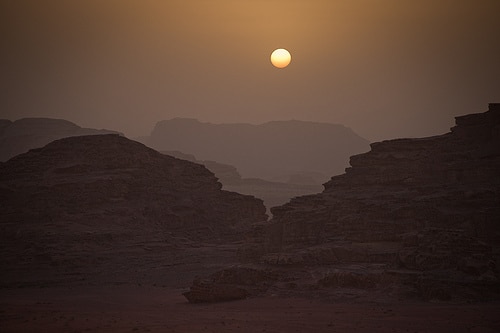The desert sun was sinking slowly behind the sandstone mountains of Wadi Rum and the herdsmen were returning to their tents. A local Bedouin in traditional Arab thawb and keffiyeh was answering his phone in almost fluent English. We sat down in a crowded falafel joint in downtown Amman. The evening call to prayer echoed above the city and a bootleg DVD peddler started dipping his bread in hummus, ending another 16 hours of fasting during the month of Ramadan. A group of kids from a remote village, all in FC Barcelona shirts, clamored in Arabic; one started calling out my supposed name, “Jackie Chan,” and the other two dashed forward in my direction, trying to steal the deflated soccer ball right from under my foot.
Mere snapshots of my brief experience in the Middle East, these moments nevertheless delivered a fresh sense of excitement, exhilaration and even bewilderment. Throughout my six-week-long journey covering almost the entire country of Jordan, I was in a constant state of cultural shock. Starting in the southern port city of Aqaba, I joined a group of American teenagers with whom I traveled north into the Wadi Rum desert and then to the mountainous town of Rajev, further north. From there I hitchhiked to the beautiful Dana Nature Reserve before finally arriving in Amman, the Hashemite Kingdom’s capital in the north. I could recall the frustration from the language barrier during a village homestay, when I could only answer with my pathetic Arabic, consisting of five words: “aiwa” (yes), “la” (no), “mumkin” (maybe), “shukran” (thank you), and “ma fahinmt” (I don’t understand).
I always marvel at the Arabs’ amazing hospitality: total strangers on the street would start chatting with you, offer to show you around town, and even invite you for a cup of hot shai (the Arab tea, unfailingly too sweet for a Chinese’s taste) at home with as many as 20 family members. This is perhaps owing to the Arabs’ tradition of tight-knit communities. I remember admiring the Jordanians’ efforts to modernize when I spoke with officials from USAID who were working with Jordanian locals on various development projects. I also learned about their common obsessions over soccer, WWE, and action movies with Bruce Lee. Yet there were also the disturbing aspects, like the lack of direction or purpose I saw in local village kids — many who would most likely drop out of school to work in the tourism industry — killed time by roaming the streets, to the hatred from a Palestinian lady, who exhorted Palestinian refugee children in Amman to reclaim the land in Palestine through violence.
Doubtless, the Middle East is one of the most exposed regions in the world, bombarded everyday with media reports, but it is also one of the least known regions, considered worlds away from us, with its people, alive and real, hidden beneath their images on the TV. A friend at Groton School once voiced his opinion in private that “all Muslims must be expelled from this country because they are but a bunch of terrorists.”
Despite globalization and rapid improvements in information technology, the world still faces what Paul Newman calls “a failure to communicate.” This seemingly eternal failure originates from our unawareness of the world beyond our immediate surroundings. As much as we would like to deny it, our minds are never isolated entities. Rather, they are unavoidably susceptible to external influences. Problems emerge when one becomes so immersed in these influences that one takes them for granted and stubbornly refuses to acknowledge different circumstances.
Stepping outside of my comfort zone, especially Groton School’s Circle, which is a bubble, and taking the initiative to learn about a drastically different world, I’ve had a better understanding on that grandiose term, “global citizenship”: different peoples around the world share so much, and yet they are divided often because of superficial differences. Traditionally considered an “elite” school that produced countless public servants and world leaders, among them the great FDR, Groton has always sought to instill in its students the importance of service. From my summer experience, I would add that it is through true understanding that we could be of more meaningful service.
This blog was first published in 2013.


